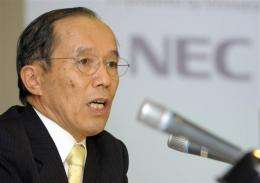President of Japanese electronics giant NEC, Kaoru Yano, is pictured in Tokyo. Japan's ailing IT giant NEC Corp. said Thursday that it would withdraw from a government-backed supercomputer project as part of its efforts to cut costs during the economic slump.
Japan's ailing IT giant NEC Corp. said Thursday that it would withdraw from a government-backed supercomputer project as part of its efforts to cut costs during the economic slump.
NEC has been involved in the development of a next-generation supercomputer along with the Riken institute and fellow electronics makers Hitachi Ltd and Fujitsu Ltd. since 2007.
The project aims to design and build the fastest supercomputer in the world for use in scientific research, from life sciences to nanotechnology.
Following the move Hitachi -- which jointly developed the "vector" central processing unit with NEC -- also decided to pull out, the institute said.
NEC has long been one of the top players, along with Intel and IBM, in the development of supercomputers.
But the Japanese group, which lost 296.6 billion yen (3.05 billion dollars) in the year to March, said it had decided to pull out as the team has completed the development stage and was now moving to testing and manufacturing.
"The company is working to strengthen its profitability by all means including cutting jobs and reviewing projects amid the exacerbating economic environment due to the global downturn," NEC said in a statement.
"As the next-generation supercomputer project shifts to the phase of manufacturing, a large amount of investment linked to producing the hardware is expected," it said.
"The spending would significantly weigh on the company's financial health."
Japan's high-tech giants have been badly affected by the global economic slowdown, which has pushed down demand for their products and sent the yen soaring, eroding export earnings.
Hitachi announced Tuesday an annual loss of 787.3 billion yen, the biggest ever deficit posted by a Japanese manufacturer.
NEC is cutting 20,000 jobs worldwide and withdrawing from the personal computer business in North America and Europe, shifting its focus to the more profitable network solutions and systems businesses.
It said it would keep its own supercomputer development division.
Fujitsu said that it would remain in the project as planned. This week it unveiled the world's fastest CPU called "Venus", which will likely be installed in Riken's supercomputer.
(c) 2009 AFP
























